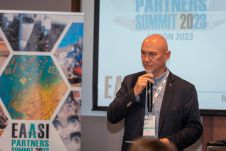OpenCitySmart and Enhanced SDIs
‘Smart Cities’ are liveable, efficient and sustainable cities, where the vertical services are built on an existing, basic infrastructure. Two experienced Hungarian SMEs, Pro Urbe and Terra Studio, recently hosted a conference on Smart City/Smart Mobility in Budapest. Their message: to achieve the goals of environmental sustainability, we need tools that facilitate an interdisciplinary approach and that are aligned with the needs/interests of the city, its citizens and the wider community. Open source and open data hold the key, as explained here.
To achieve the goals of environmental sustainability, we need tools that provide an interdisciplinary approach for survey, evaluation and audit, studying best practices, concepts, strategies, actions and business plans, impact analysis, involvement of solution providers, coordination, communication, community participation, education, ICT-supported integration, interoperability, optimisation, monitoring, etc. All of these must be aligned with the needs/interests of the city and its citizens, the wider community and society in general. Open source and open data enable effective cross-impact geospatial analysis between e.g. environment, mobility, people, government, economic development and lifestyle.
Given the current trends and related consequences from a global perspective, it is critical that we design and build Smart Cities. A population explosion is occurring simultaneously with a massive urban shift. The global population has trebled since 1950, when there was an even distribution between rural and urban areas, and today 80% of people in the developed world live in cities. Compounding this issue, we are consuming 1.5 times Earth’s sustainable resources each year. This cannot continue. The world’s cities must seriously address the issue of sustainable living. Sharing best practices and working collaboratively are key to solving these problems.
Collective problem-solving and sharing of solutions will also help us better appreciate our common needs and similar aspirations. In the CitySmart session of the NASA Europa Challenge, we will present open platforms and geospatial tools for building sustainable living solutions. These applications will contribute to an ‘OpenCitySmart’ suite of functionalities for managing urban living, i.e. infrastructure, mobility, power, water, sewers, city services, fire, safety, public health, construction, permits, transportation, agriculture, etc.
The organisers of the NASA Europa Challenge 2016 especially wish to target the computer science/software engineering departments at universities, as this is a high-visibility and career-enhancing opportunity for students and young graduates, as demonstrated by the award winners of the previous three years (http://eurochallenge.como.polimi.it). Geospatial web app developers are in high demand and the NASA open-source geobrowser World Wind (www.WebWorldWind.org) provides the ideal platform for SmartCity solutions.
A session at the Open Source Geospatial Research and Education (OGRS) Conference to be held in Perugia, Italy, this October is dedicated to ‘CitySmart, Open Source Apps for Urban Management’. Patrick Hogan of NASA and Prof Maria A. Brovelli of Polimi Como will announce the Europa Challenge winners at this event (http://2016.ogrs-community.org/). An Asian version of the Europa Challenge is also envisaged with the same topic for the Urban Transitions Global Summit being held in Shanghai, China, in September 2016 (http://urbantransitionsconference.com).
In the Smart City context, the enhanced spatial data infrastructures (SDIs) will incorporate novel technologies and services such as seamlessly interoperable indoor/outdoor spatial data infrastructures, big data cloud services, location-based services, mobile GIS apps, spatially enabled Internet of Things (IoT), and the highest-resolution remote sensing from satellites and UAVs. Data access is essential, but even more important is to share experiences and solutions through cooperation and collaboration using open source.
The data issue was explicitly addressed at the GEO XII Plenary and Ministerial Summit held in Mexico City last November by EO and ICSU/Codata WDS experts, and the Global Spatial Data Infrastructure Association (participating member of GEO) expressed its supporting position in a formal statement.
Dr. Gábor Remetey-Fülöpp,
Past secretary-general, HUNAGI
Organising member, WWEC 2016
Liaison of GSDI to CEOS WGISS

Value staying current with geomatics?
Stay on the map with our expertly curated newsletters.
We provide educational insights, industry updates, and inspiring stories to help you learn, grow, and reach your full potential in your field. Don't miss out - subscribe today and ensure you're always informed, educated, and inspired.
Choose your newsletter(s)
























